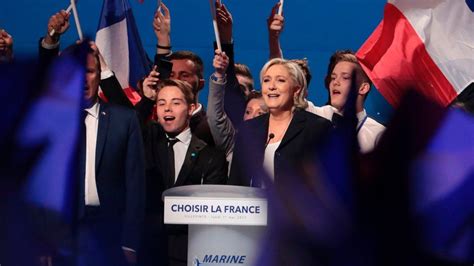France’s political landscape recently witnessed a storm as Marine Le Pen, the leader of the far-right National Rally (RN), faced a court ruling barring her from seeking office due to embezzlement allegations. In a fiery speech near the iconic Eiffel Tower in Paris, she denounced the verdict as a “witch hunt,” vowing not to surrender to what she labeled as politically motivated persecution.
“I won’t give up,”
Le Pen declared defiantly in front of her fervent supporters, highlighting her determination to challenge the decision that accused her of misappropriating €2.9m (£2.5m) of EU funds for her party over a twelve-year span. The ruling imposed a five-year electoral ban on Le Pen, prompting her to launch an appeal against what she deemed a biased judicial outcome.
The contentious legal battle triggered widespread reactions across France’s political spectrum, with Jordan Bardella, RN’s president, lambasting the court’s judgment as
“a direct attack on democracy.”
Allegations of interference and ulterior motives behind the conviction echoed through political circles, igniting debates about justice and fairness in the country.
As accusations flew back and forth between rival factions, Gabriel Attal from President Emmanuel Macron’s centrist Renaissance party issued a stern rebuttal emphasizing accountability:
“You steal, you pay.”
The clash between Le Pen’s staunch defenders and critics added fuel to an already incendiary situation that captivated both domestic and international audiences.
Amidst escalating tensions, prominent figures such as US President Donald Trump weighed in on the controversy surrounding Le Pen’s legal woes. With global attention fixated on the unfolding drama, parallels were drawn between Le Pen’s predicament and historic civil rights struggles like those led by Martin Luther King Jr., underscoring the symbolic significance attached to her fight for political survival.
The aftermath of the ruling saw contrasting public opinions emerge regarding the perceived impartiality of justice in handling high-profile cases like Le Pen’s. A post-verdict poll reflected divided sentiments within French society, indicating varying degrees of trust in the legal system’s ability to dispense fair judgments without bias or undue influence.
Looking ahead, uncertainties loomed over France’s upcoming presidential elections scheduled for 2027 as speculations swirled around potential candidates amidst shifting political dynamics caused by Le Pen’s disqualification. The intricate web of alliances and rivalries underscored the profound impact of legal controversies on shaping electoral outcomes and reshaping power structures within France’s volatile political arena.
Despite facing significant legal hurdles and mounting challenges on her path to leadership aspirations,
Marine Le Pen stood resilient amid adversity.
As she navigates stormy waters fraught with uncertainty,
her unwavering resolve casts a shadow over France’s political landscape,
signaling turbulent times ahead for its citizens.
In this saga playing out at Paris’ epicenter,
Marine Le Pen remains an enigmatic figure
whose fate intertwines with France’s destiny,
where echoes of justice reverberate
across cobbled streets steeped in history.
With each twist and turn defining this gripping narrative,
the nation holds its breath awaiting
the final chapter yet unwritten,
in an unfolding tale encapsulating
the essence of power politics’ timeless intrigue.





Leave feedback about this